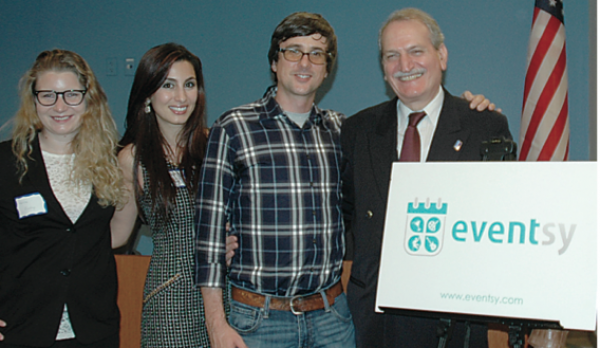By Constantine S. Sirigos
TNH Staff Writer
NEW YORK – Brian Meece, the CEO and co-Founder of crowdfunding pioneer RocketHub inaugurated the After Work Speaker Series of Eventsy, the multifaceted members-only social and professional networking club, with an informative and entertaining presentation about the birth of his company and how it helps entrepreneurs.
After welcoming the guests Maria Pardalis, Eventsy’s founder and president, and acknowledged the support her young company received from numerous Hellenes, and from Meece – she is also a happy client.
Meece thanked Pardalis “for the most amazing intro I have ever had and for inviting me to speak,” and launched into a talk filled with priceless advice for entrepreneurs.
To get into people’s heads, it helps to use the brain’s own tactics. To get something to stand out from the information clutter, bind it to emotions by framing it with a memorable story. Meece is a master. He captivated the guests with his path from the art world to high tech CEO. After studying film he worked in TV in the 1990s. He also plays a mean ukulele but while he left all that behind, the creative processes he was exposed to led to RocketHub.
He saw technology beckoning, but he needed to fill knowledge gaps, so when his wife was hired by Columbia University he seized on the tuition benefits.
“I formed RocketHub as a first semester graduate student…As social media boomed around 2008…I saw there was an opportunity in this connectivity that was happening and that it was a foundation to build upon.”
He knew he could not build it alone, and used his band experience that taught him how to gather diverse and talented ensembles of people.
“Surround yourself with the brightest and sharpest people you can. Trust me they will only make you look good,” he said, adding it is important find people whose skill set differs from yours, but with whom you have commonalities.
“Do whatever you can to rope them in. I would not be here without a great band, my co- founders.”
RocketHub had a remarkable takeoff and is now soaring. Formed in 2009, the platform was launched in 2010 and “and we are now the third largest player of our type on the planet.”
He calls crowdfunding a compressed sliver of entrepreneurship as a whole, and described it as “an online event that harnesses networks and communities for funding, awareness,” and perhaps most importantly, “feedback on how you can keep making your venture better.”
Meece also said people have a deep-seated impulse which finds a ritual in crowdfunding that expresses the natural urge “to support the ideas we care about and fund people who are doing amazing things – and get- ting rewarded for it.”
The having your cake and eating it-too concept has helped Meece as well because telling their clients’ stories makes RocketHub itself a fascinating media story. “People think it was a brilliant strategic move but it was really a happy accident, but we’ll take it,” said not the first man to discover that helping others helps you, too.
After being on the cover of USA Today’s money section, Meece got a call from A&E Net- works that turned into a documentary and could lead to a reality show about startups – which the network would also support. Called Project Startup, the network saw RocketHub as a great story funnel. “God’s delays are not God’s denials. For me to have a story on A&E, not just about my story but other stories that we’ve helped, is a dream come true. As a TV guy I never got that far, but it’s funny that as a technology guy I did it.”
Meece shared the three core elements of successful startups which he believes apply to any endeavor: An amazing story-driven project, networking to initiate the project, and goods or ser- vices that people want and the market is excited about.”
Network until you drop he said. “Use your social capital and ability to influence others…Get in the room with the stuff you want – you never know what will happen.”
He warned about falling in love with your own ideas and being overprotective: “You have to get your ideas out there and get feedback on them.”
His great insight is that it is not only the “what” that gets people excited, but the “why” – the story.
“We call it the Y-factor. Take the why are you making what you are making and doing what you are doing, and encapsulate it into a story that shifts some- one’s emotional state.”
That’s how you get people to stop, pay attention and invest.
